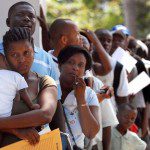Expanding the Temporary Protected Status (TPS) program for Haitians is wrong.
 Last week, Secretary of Homeland Security Janet Napolitano announced an 18-month extension of the Temporary Protected Status (TPS) program for Haitians, much to the dismay of non-Haitian Floridians, who claim that Haitians disproportionally contribute to violent crime.
Last week, Secretary of Homeland Security Janet Napolitano announced an 18-month extension of the Temporary Protected Status (TPS) program for Haitians, much to the dismay of non-Haitian Floridians, who claim that Haitians disproportionally contribute to violent crime.
Many in Orlando resent the extension of this status for Haitians and point to the sheer violence that seems to pop up whenever the Haitian numbers go up.
Perhaps, Janet should have called Hillary over at the State Department for the breakdown.
According to the US State Dept, “there are no “safe” areas in Haiti. There is a persistent danger of violent crime, which can be subject to periodic surges sometimes not obviously explained by other events or conditions. Haiti is a key transit point for drugs coming to the United States. Law and order in Haiti has steadily deteriorated as a result. Kidnapping, death threats, murders, drug-related shootouts, armed robberies, home break-ins and car-jacking are common in Haiti. Generally, these crimes are committed by Haitians against other Haitians, but foreigners and U.S. citizens have been victimized. The incidence of kidnapping in Haiti has diminished from its peak in 2006 when 60 U.S. citizens were reported kidnapped. In 2010, there were twelve reported kidnappings of U.S. citizens, twelve homicides, six aggravated assaults, two sexual assaults, and 82 reported robberies. Many U.S. citizens who were kidnapped reported being beaten and/or raped by their hostage takers. Kidnapping remains the most critical security concern, and kidnappers frequently target children.”
Comments from around Orlando include statements like the following from Mike R.:
“The bottom line with all of this is that nothing good will come out of this for those of us that have lived here for awhile. This will increase crime, welfare, food stamps and overload our emergency rooms and hospitals. These Haitians will come here and have more children that they can’t feed or support, this is a nightmare.”
Some of this concern may stem from what is actually occurring in South Florida, in the notorious neighborhood known as Little Haiti.
While most Haitians abide by the law in the U.S., Little Haiti consistently comes in amongst the worst neighborhoods in the nation with its incredibly high violent felonies.
Fast forward to Pine Hills and its influx of Haitians and one can easily surmise why there is resistance to more Haitians.
It’s well documented that Pine Hills Road has seen an increase in crime involving Haitians. And one only has to drive down Pine Hills Road on a Saturday or Sunday to see total disregard for zoning laws, as this State Roadway becomes a haven for ad-hoc flea markets and open markets.
Sure, there is need to be compassionate in light of the devastation Haiti suffered from hurricanes, earthquakes and a deadly cholera outbreak. But perhaps greater thought ought to have been given to extending the TPS program for Haitians in the U.S.


